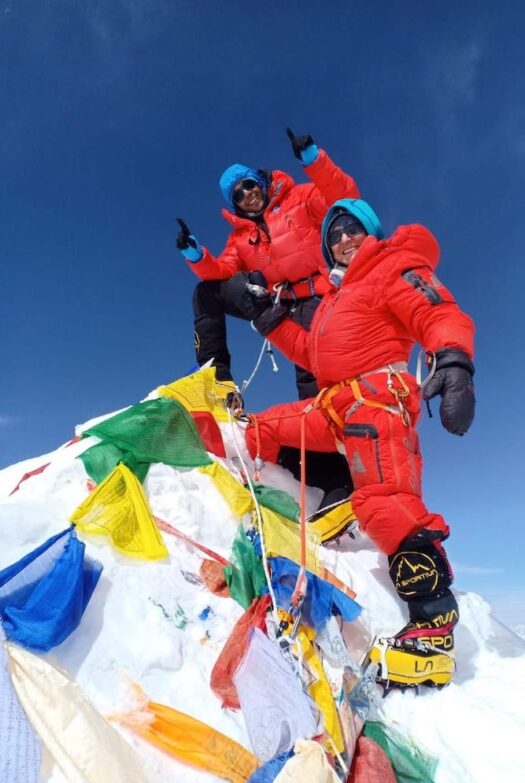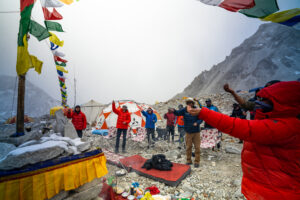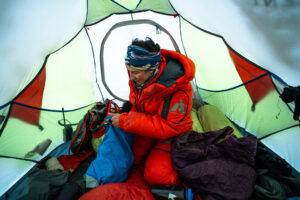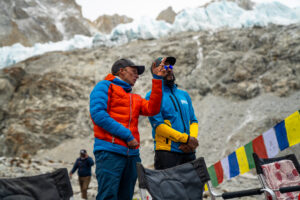Alpenglow’s Success on Makalu via Rapid Ascent

Written by Griffin Mims, International Coordinator
On May 12th, 2022, Alpenglow team members Christina Ochs, Topo Mena, Ngima Tenzing Sherpa, and Phu Rita Sherpa summited the 5th tallest peak in the world after just 16 days on the mountain. At 27,766 feet (8463m) Makalu is one of the most difficult and coveted summits on the planet. Our Rapid Ascent Approach allowed our team to achieve this remarkable feat in only 26 days round trip.
We’ve broken down our Rapid Ascent Approach into three components: pre-acclimatization, quality logistics, and a decade of experience running safe and efficient expeditions on the tallest mountains in the world.

Pre-Acclimatization:
For the last ten years we have partnered with Hypoxico, a company that specializes in a hypoxic tent system that simulates high-altitude conditions in an enclosed space, intended for home use. For our Makalu Rapid Ascent Expedition, our team members spent roughly six weeks sleeping in the tent in the comfort of their own homes, acclimatizing all the way up to 18,500’ before leaving for Nepal. Christina, for example, was able to use a Hypoxico tent to sleep 4,000’ higher than the tallest point in the contiguous United States from her home in Chicago, Illinois.
Once the team was in Nepal, they wasted no time getting after it. The day after they arrived they flew by helicopter from Kathmandu to the village of Pheriche and trekked to 16,500’ the same day. Then they spent the next two days trekking up to 18,300’ to build on top of their at-home acclimatization before flying via helicopter straight to the Makalu Advanced Base Camp at 18,700’.
By pre-acclimatizing with Hypoxico, we’re able to shave weeks off our expeditions otherwise spent running laps up and down the mountain, climbing high and sleeping low to acclimatize naturally. With Rapid Ascent, we’re able to arrive at Base Camp ready to climb high almost immediately.
For many Himalayan expeditions, it typically takes a week or more of trekking to reach base camp, and then another week or so acclimatizing at basecamp before teams can start pushing to higher altitudes. If climbers are pre-acclimatized, however, they can forgo difficult and taxing treks to basecamp, and it is at this stage where our high-quality logistics are able save us even more time in the mountains.

Quality Logistics:
The trek into Makalu Advanced Base Camp, for example, typically takes 7-10 days. The trek is long, hard, and can be draining for climbers, knocking them down before even getting a chance to set foot on the mountain. Pre-acclimatization via Hypoxico makes it safe to utilize helicopters for transportation, while climbers might otherwise suffer from altitude sickness (or HAPE/HACE, more advanced and life-threatening stages of altitude sickness) if they were to fly straight to basecamp without prior acclimatization.
When the Alpenglow Rapid Ascent team flew into the Khumbu, they went from Kathmandu (4,593′) to Pheriche (14,500’). After two days in Pheriche, they took a helicopter over the Amphu Labtsa pass straight to Makalu Advanced Base Camp at 18,700’. After only one day of rest in ABC, Christina and Topo touched C1 at 21,000’. Thanks to pre-acclimatization and helicopters, our team reached the mountain and completed their first advanced acclimatization rotation in a mere seven days, a process that would otherwise require weeks of preparation. Himalayan expeditions are long by nature, and once team members reach the summit, they’re usually ready to go home soon after, but must still make the arduous return trek to Kathmandu or elsewhere. Our Makalu Rapid Ascent Team summited on the 12th and was back in Kathmandu the morning of the 13th, just in time for lunch.
The quality logistics that set up our teams for efficiency and success don’t stop with transportation. They extend to having the most comfortable base camp and highest quality food possible. Adrian ultimately believes that comfort leads to success. Having a comfortable base camp and good, clean food allows our team members to recover more quickly and thus climb more efficiently. On Makalu, our team was eating everything from homemade pizza and fresh momos to apple pie. We have three kitchen staff that help prepare our meals, making sure that our team is getting the appropriate nutrition and fuel necessary to take us farther up the mountain. Our teams also sleep in their own private tents and are greeted with coffee or tea every morning by our kitchen team, making sure we’re starting the day on the right foot.
Additionally, we have a dining and lounge tent complete with a movie projector, an inflatable couch, and WiFi to keep our team connected to the outside world while on the biggest mountains in the world. More importantly, we adhere strictly to Leave No Trace principles while on the mountain. This means that we’re taking care to take all our waste off the mountain, including trash and human waste, to keep the mountain pristine for the next generation.

A Decade of Experience:
Adrian and Alpenglow were the first company to offer faster expeditions to the world’s tallest peaks, and we’ve continued to develop and perfect the system since 2012. Adrian first started using the Hypoxico systems after learning about endurance athletes using them to give them an edge in their events. He quickly found success using the system himself on big mountains, and by 2014 the majority of Alpenglow’s high-altitude expeditions were all done using this newly developed Rapid Ascent Approach. Over the last decade, the Rapid Ascent system has supported hundreds of successful summits, including on Cotopaxi (19,347’) within 48 hours of touching down in Ecuador, Aconcagua in just seven days, and Mt. Everest in just 14 days door-to-door from the United States.
This success is due not only to the expertise of our logistics team, but also our experienced guides. Our Himalayan guide teams are fully certified IFMGA Mountain guides with years of experience under their crampons. That said, Rapid Ascent Expeditions are innately different from a typical expedition, and in order to find success during these climbs the guides need to understand how and why the Rapid Ascent system works. Our guide teams have spent season after season climbing big mountains in this style and thus know the system intimately, helping maximize the team’s chances of success while minimizing risk.
Our guides’ prowess in the big mountains played a pivotal role in our Makalu team’s success this spring. Alpenglow team member Christina Ochs had already used the Rapid Ascent system with Alpenglow for several expeditions, leading her to successful summits of Ama Dablam, Cho Oyu, and Mt. Everest. When it appeared that an early season weather window was approaching, Topo and Christina weighed the options of a summit bid, even though they had only been on the mountain two weeks, with just a single night spent at C2 at 21,700’. Ultimately, they decided to go for it.
Christina’s success on Makalu was a direct result of both our guided preparation and her own personal efforts to be ready: she felt well-acclimatized from the pre-acclimatization process and their rotations on the mountain, she was feeling strong and well-rested from time spent in the comfort of ABC, she had prior experience at these altitudes, and she trusted Topo and the Sherpa team to make the right decisions up high. They left base camp on May 9th, and three days later were standing at 27,766’ on the summit of Makalu.
Quality over quantity is the name of the game: fewer days spent acclimatizing means fewer days spent idle in the big mountains creating waste and leaving traces of human activity. Moreover, less time spent in these places reduces the chance of an accident. Thus, the entire Alpenglow team lives and breathes Rapid Ascent, from our founder and guides to our International Expedition and Logistics Coordinators. Rapid Ascent has been our mantra for a decade and is at the heart of our international programming, not only for the sake of safety, but for the sake of respect and preservation for the places that fuel our spirits.